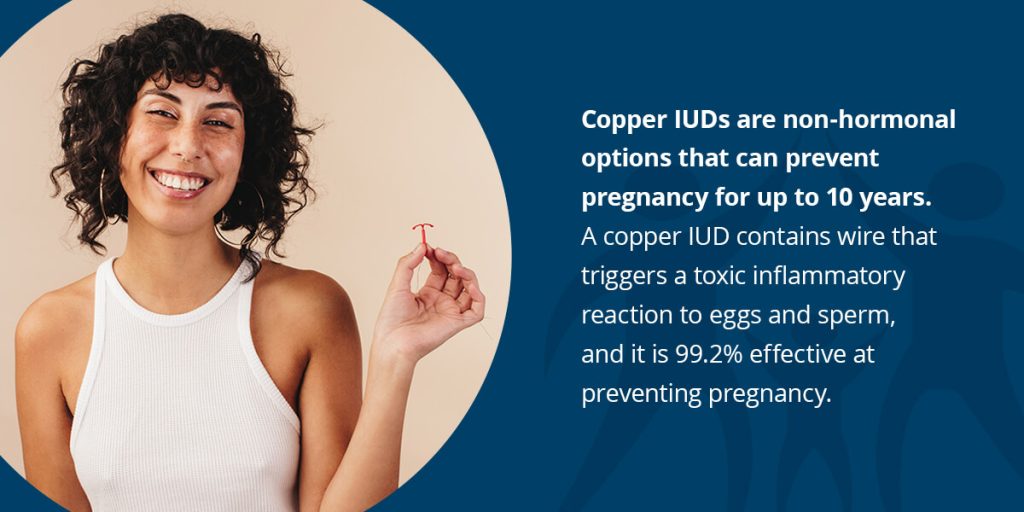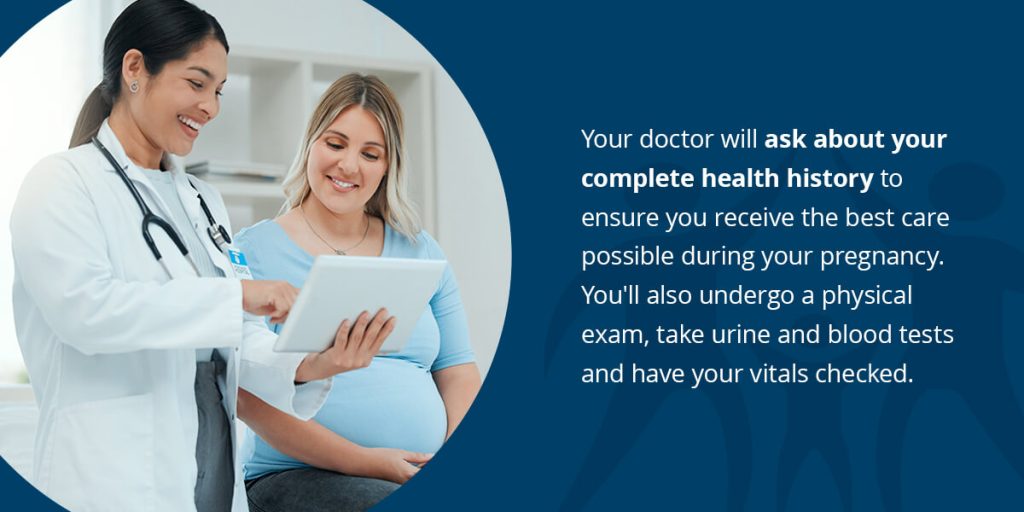Birth Control Options
If you want to start using birth control, you should know that various methods offer different effectiveness and risk levels. Understanding each option is crucial. Choosing the correct birth control depends on factors such as your health condition, lifestyle, future plans and sexual partners.
Different Types of Birth Control
Different birth control methods work in various ways. Before choosing contraception, consider the following options.
Hormonal Birth Control
Hormonal birth control releases hormones into a woman’s body, stopping ovulation and thickening cervical mucus to prevent sperm from reaching eggs. Hormonal birth control is available in the following forms.
- Oral contraceptives: Combined oral contraceptives contain progestin and estrogen, but you can choose a progestin-only pill if you can’t take estrogen for medical reasons. Both oral contraceptives are 93% effective and require people to take a daily pill.
- Hormonal injections: If you select the hormonal injection birth control method, you’ll receive a shot containing progestin from your doctor every three months. This method is 96% effective at preventing pregnancy.
- Hormonal implant: A doctor embeds a hormonal implant under the skin of your upper arm, where it can remain for up to three years. This small, rod-shaped device releases progestin, and it is 99.9% effective.
- Patches: Birth control patches release estrogen and progestin into the bloodstream, and they are 93% effective. This method involves applying a patch to the buttocks or lower abdomen once a week for three weeks and abstaining from wearing a patch during the fourth week to allow menstruation to occur.
Hormonal birth control methods can increase the risk of some cancers by releasing synthetic hormones that can stimulate cancer development and growth. Hormonal birth control can also increase the risk of developing a blood clot.
You can visit a doctor to obtain a hormonal contraceptive prescription or discuss your options.

Copper IUDs
Intrauterine devices are devices placed inside the uterus to kill sperm or prevent its movement. An IUD is a small, plastic, T-shaped device that comfortably fits inside a woman’s uterus.
Copper IUDs are non-hormonal options that can prevent pregnancy for up to 10 years. A copper IUD contains wire that triggers a toxic inflammatory reaction to eggs and sperm, and it is 99.2% effective at preventing pregnancy.
A copper IUD lacks the risks of hormonal birth control such as blood clots, but it can present dangers for women with the following conditions:
- Cervical or uterine cancer
- Pelvic infection
- Uterine abnormalities such as fibroids
- Unexplained vaginal bleeding
- Wilson’s disease — a condition in which vital organs absorb too much copper
In some situations, IUDs can cause infection or uterine perforation. An IUD can also slip out of its position in the uterus, increasing the risk of pregnancy.
Once an IUD is in place, you don’t have to do anything else to prevent pregnancy. Still, you can use a barrier method such as a condom to prevent sexually transmitted diseases if needed.
Hormonal IUDs
Doctors insert hormonal IUDs into the uterus like copper IUDs, but hormonal IUDs release various amounts of hormones instead of copper. They are typically 99.6% to 99.9% effective at preventing pregnancy. Hormonal IUDs vary in duration, size and the hormones they release based on their type.
- Skyla: Skyla can prevent pregnancy for up to three years.
- Kyleena: Kyleena prevents pregnancy for up to five years.
- Liletta: Liletta is effective for up to six years.
- Mirena: Mirena provides pregnancy prevention for up to seven years.
Hormonal IUDs can present the same risks as other hormonal birth control methods and copper IUDs.
Barriers
Barrier birth control methods block sperm from reaching eggs, and some of these can also prevent STDs. Different types of barrier birth control consist of the following options.
- Condoms: External condoms fit over the penis, and internal condoms fit inside the vagina. External condoms are 98% effective at preventing pregnancy and STDs when used correctly. Internal condoms are 95% effective with correct use.
- Spermicide: Spermicides are substances containing chemicals that stop sperm movement. Spermicide alone is approximately 79% effective at preventing pregnancy, so doctors recommend combining it with more reliable methods such as condoms or diaphragms. Spermicide cannot prevent STDs.
- Sponge: A sponge contains spermicide and covers the cervix during intercourse. The sponge must remain inside the vagina for at least six hours following the last sexual activity to be effective. Sponges are 86% effective in women who have never given birth, but the rate drops to 73% if a woman has given birth.
- Diaphragm: Diaphragms are cup-shaped barriers that cover the cervix and block sperm. Diaphragms are 83% effective at preventing pregnancy when you use the correct size and apply spermicide correctly.
You can purchase condoms, sponges and spermicide over the counter, but diaphragms require a prescription. A doctor must fit you to prescribe the correct size.
Natural Birth Control
Natural birth control is also known as family planning or the fertility awareness method. This approach requires women to track their menstrual cycle to know when they are likely fertile. When practicing this method, you should avoid unprotected sex during days you believe you are fertile.
FAM has an approximate 76% pregnancy prevention rate when implemented correctly, but it depends on your ability to track your cycle to accurately determine when you are fertile.
Sterilization
Sterilization is a surgical procedure that permanently prevents pregnancy.
- Vasectomy: A man can undergo a vasectomy to prevent his sperm from reaching the penis. Men typically get this procedure at an outpatient surgical center. Approximately 12 weeks after a vasectomy, a man’s ejaculate should lack sperm. Men must visit their doctor to ensure their sperm count is zero before having unprotected sex. A vasectomy is 99.8% effective at preventing pregnancy.
- Tubal litigation: Tubal litigation closes the fallopian tubes to prevent sperm from reaching eggs during intercourse. Women can talk with their doctors to schedule this surgery at a hospital or outpatient surgical center. This method is 99.5% effective immediately following the procedure.
A vasectomy presents minimal risks, but men may experience discomfort, bruising or swelling following the procedure. Infections and hematomas are also possible. Men should see a health care provider if they experience swelling and bleeding under the skin or scrotal tenderness and redness combined with a fever.
Tubal litigation presents a small risk of pregnancy if a procedure does not fully close the fallopian tubes, and there is a small risk of nearby tissue or organ injury during surgery.
How to Choose Birth Control
The best birth control for you depends on your lifestyle, sexual partners, health condition and desire to have children in the future. Before choosing a method, consider the following factors.
Lifestyle
If you lead a busy lifestyle and find it difficult to maintain daily habits, you should avoid oral contraceptives and opt for a long-term option such as an IUD or hormonal implant. These devices eliminate the risk of forgetting to take a daily pill.
Sexual Partners
If you engage in sexual activity with one exclusive partner, hormonal birth control or an implant are excellent options. However, you should also consider barrier protection, such as condoms, if you have multiple sex partners.
Health Condition
Avoid hormonal birth control if you are older than 35 and smoke tobacco, because this can increase the risk of high blood pressure and blood clots. Also, you shouldn’t get an IUD if you have uterine abnormalities or have had cervical or uterine cancer. A doctor can review your complete medical history to help you determine your best options.
Future Plans
Before choosing a birth control method, think about how many children you may want in the future. For example, you can immediately stop taking birth control pills if you decide to start a family.
Sterilization is an effective option if you don’t want children or already have children and don’t want to add to your family. However, you should only choose this approach if you don’t expect to change your mind.
Contact Hamilton Health Center to Discuss Your Birth Control Options
With birth control, you can take ownership of your wellness and future. Hamilton Health Center can help you make an informed decision based on your needs and medical history. Our caring providers deliver affordable, quality care to individuals in a welcoming environment. Contact Hamilton Health to learn more about our services and how we can help you choose and start a birth control method.
Prenatal Care
Prenatal care is essential to prepare for the birth of your child. There is a lot to keep track of during pregnancy to protect mothers and babies, which can confuse new parents. Prenatal care helps simplify the process by providing you with guidance throughout the entirety of your pregnancy.
Below, you’ll learn more about the importance of prenatal care, what to expect from your visits and prenatal advice to help improve the health of yourself and your baby throughout your pregnancy.
What Is Prenatal Care?
Prenatal care refers to getting routine checkups from nurses, doctors or midwives throughout pregnancy. Prenatal care is important for your baby’s health and your well-being as a mother. Care can start during pre-pregnancy planning, but if this isn’t possible, it’s best to start prenatal care as soon as you know you’re pregnant.
During your prenatal visits, your doctor, nurse or midwife will observe your baby’s development while focusing on improving your health and well-being, which influences your baby’s health. You should speak with your doctor about prenatal care as soon as you become pregnant.
Prenatal Care vs. Perinatal Care
Prenatal care refers to the regular checkups women undergo while pregnant. Perinatal care refers to the health care women receive during and directly after the birth of their child. Many women who receive perinatal care have high-risk pregnancies, or the mother or child has a severe medical condition. Perinatal care can include:
- Screening tests for congenital disabilities and diagnosis
- Care for congenital disabilities, such as congenital heart disease, bladder outlet obstructions and pleural effusion or fluid in the lungs
- Post-birth surgeries due to perinatal conditions in newborns
- Care for heart defects
- Support and guidance for the transition home after the birth
Many reasons exist that a child or mother might need perinatal care during or after birth. Prenatal care can help reduce the risk of complications during childbirth, so it’s always best to consult your doctor as soon as you become pregnant.
Benefits of Prenatal Care
Prenatal care helps improve the health of the mother and fetus, increasing the chance of a successful birth and a healthy child. There are many benefits of prenatal care, including the following:
- Reducing pregnancy complication risks: Prenatal care can help reduce complications by providing prenatal care guidelines to keep you in good health. Some of these guidelines or instructions include participating in moderate exercise, controlling preexisting conditions, eating a good diet and avoiding using or being around harmful substances, such as drugs and alcohol.
- Reducing fetus and infant complications: Using substances during pregnancy can significantly increase the risk of health defects in fetuses and newborns. Substances like tobacco, alcohol and drugs can cause numerous complications, such as physical abnormalities, cardiovascular issues and mental health issues. Prenatal care will help you learn how to stay away from substances while pregnant and monitor the health of your fetus during each trimester.
- Ensuring adequate vitamins and nutrients for the mother and child: Prenatal vitamins are essential for the health of the mother and child. During your prenatal visits, a medical professional will be able to give you recommendations on what vitamins to take during your pregnancy to ensure your and your baby’s health. Folic acid is a popular ingredient in prenatal vitamins because it can help reduce the risk of various defects by more than 70%.
- Ensuring medications are safe during pregnancy: Some medicines aren’t safe to take while pregnant and can increase the risks of adverse health effects for the fetus and child. During your prenatal visit, your doctor will ask what medications you’re taking and determine which are safe to use while providing alternatives for those that aren’t.
Different Types of Prenatal Care
Prenatal care includes more than just a couple of ultrasounds and a few doctor’s visits. You’ll go through different tests and exams to measure your and your baby’s health. Some of the different types of care you can expect during your visits include:
- Testing: Your doctor will perform the necessary testing to check your and your baby’s health. Some of these include tests for blood, infection, anemia, diabetes and other things that could affect the mother or fetus’ health. You’ll also receive screening tests to look for possible conditions your baby may have, such as Down syndrome, cystic fibrosis or gestational diabetes.
- Checkups: Regular checkups are an essential part of prenatal care. These checkups will monitor your baby’s growth and your overall health and well-being. You’ll likely have an ultrasound during your checkups, and you may undergo additional testing to check different things, such as your hormone levels.
- Activity monitoring: Once you reach a particular stage of your pregnancy, your doctor will monitor your baby’s activity, looking for regular movement or irregularities that require your doctor’s care. Counting your baby’s movement at home and reporting the movement to your doctor can help you assess your baby’s activity better. Call your doctor immediately if you don’t feel any activity at all once you’ve reached 28 weeks.
You may undergo additional testing based on age, medical history, test results and ethnic background. Talk with your doctor about the tests you may experience during prenatal visits.

What to Expect at Your Prenatal Care Visit
During your first visit, your doctor will ask about any previous pregnancies, operations or diseases. Your doctor will ask about your complete health history to ensure you receive the best care possible during your pregnancy. You’ll also undergo a physical exam, take urine and blood tests and have your vitals checked. You might also receive other tests, such as a cervical exam, mammogram or pap smear.
As your pregnancy develops, you’ll go in for additional visits to check your vitals, your baby’s growth and your baby’s heartbeat and activity. Your doctor will check for potential complications or conditions, such as preeclampsia, anemia or gestational diabetes. The prenatal care timeline for pregnant women looks like this:
- Starting prenatal care between eight and 12 weeks of pregnancy
- Attending prenatal care appointments every four to six weeks during the first and second trimesters
- Checking in with your doctor or midwife every two to three weeks once you reach 28 weeks and until 36 weeks
- Going to your doctor or midwife between 36 and 40 weeks for a pelvic exam and weekly visits
After these appointments, you’ll give birth and switch from prenatal care to neonatal care.
How to Choose the Right OB-GYN
When looking for an OB-GYN and prenatal care options in PA, you want to ensure that they offer the right services to ensure your and your baby’s health throughout your pregnancy. Look for the following prenatal care services from your OB-GYN:
- Pregnancy testing
- Overall health assessments through the duration of your pregnancy
- Delivery assistance
- Postpartum care
- Breastfeeding counseling
- Nutrition education
You should choose an OB-GYN that can monitor your and your baby’s health effectively throughout your pregnancy, testing for abnormalities and providing preventative care. You can ensure you pick the right OB-GYN by looking for an experienced clinic, doctor or midwife in your area.
You can also check reviews once you’ve found a few options, looking for the best reviews from other mothers and expecting families. If you have friends or family who recently gave birth, you can always ask them for referrals if they had a good experience with their OB-GYN.
Want to learn more about the importance of visiting an OB/GYN?
Trust Hamilton Health Center as Your OB-GYN
Pregnancy is an exciting time for many women and their families. However, it can also be stressful without the proper guidance. At Hamilton Health Center, we offer prenatal care services to ensure that you and your baby are taken care of during pregnancy. Our team aims to provide you with high-quality care and comprehensive services in one place, reducing the need to visit multiple offices or clinics during your pregnancy.
We provide regular testing and exams through each trimester of your pregnancy and educational resources to help you prepare. We can help you make decisions about your care in confidence. Learn how we can make a difference in your pregnancy care, and contact us today to get started!
More Resources for Women
Self-Breast Exam Tips
 You may have heard there are many advantages of performing breast self-examinations. Women sometimes detect lumps that prompt their physicians to send them for mammograms, which can uncover signs of breast cancer.
You may have heard there are many advantages of performing breast self-examinations. Women sometimes detect lumps that prompt their physicians to send them for mammograms, which can uncover signs of breast cancer.
You should also perform breast self-exams for other reasons. Breast exams help you become familiar with your breasts so you can report any changes in them to your physician. Most changes are benign, but occasionally there is a more serious reason for them.
If you have never self-examined your breasts, you may be unsure how to begin. Follow these exam tips to give yourself an effective breast self-exam.
Tips for Breast Self-Exams
Here are a few ways you can learn to do your examinations quickly, thoroughly and effectively:
- Ask your doctor or healthcare provider to show you how to do it: Talk to them about what they recommend for their patients and to explain what you should be looking for. While online guides can be helpful, speaking to a breast specialist is a great way to ensure effective examination.
- Time your exams to your menstrual cycle: Choose a time of the month when your breasts are less tender. Many women do this during the week after their period. If you examine your breasts at the same time every month it’ll be easier to detect breast lumps or breast changes.
- Look in the mirror before you start: Begin by examining your breasts to get a feel for what they look like. Search for dimpling and puckering, and note the shape and size of the breasts. Examine them with your hands raised as well and look beneath each breast to judge their symmetry. This will help you identify changes in the future.
- Do the physical exam standing up or in the shower: The tissue thins out when you lay down. You will also find soaping your fingers helps in the shower.
- Use the pads of your three middle fingers: Apply different levels of pressure and do it in a constant pattern to assure you do not miss any parts. For instance, you might do it circularly along with light pressure.
Women with disabilities that make it difficult to do any of this should ask their doctor for tips on how to proceed.
What Are Normal Lumps in the Breast?
All breasts have lumps. You will become familiar with these as you perform your exams regularly. Most lumps are normal and do not require a trip to the doctor. Abnormalities in the breast may include very hard lumps near your underarm, and you should inform your physician immediately.
Other changes you should notify your doctor about include:
- Sores or rashes on the breast
- Newly inverted nipples, pointing in rather than out
- Swelling or pain in the breast
- Any irregular breast tissue
When to Start Self-Breast Exams
Doctors generally recommend that women begin performing self-breast exams in their early 20s. Teenage girls’ breasts are still growing, and they change a lot during this process. It’s also extremely rare for a young girl to develop breast cancer. For those reasons, physicians say it is unnecessary to perform self-exams until you get older and your body has finished going through changes.
Still not sure how to perform a self-breast exam or want some extra guidance? Hamilton Health offers patient-centered health care at our state-of-the-art facility. Make an appointment with us today to discuss your breast health and breast condition.
More Resources for Women
5 Breastfeeding Tips for New Mothers
 New mothers have so much to learn. You love your baby and want to take care of them, but all the information out there can be confusing. Many mothers want to breastfeed their babies to give them good nutrition and bond with them. These breastfeeding tips and tricks for first-time mothers will help you and your baby stay happy and healthy.
New mothers have so much to learn. You love your baby and want to take care of them, but all the information out there can be confusing. Many mothers want to breastfeed their babies to give them good nutrition and bond with them. These breastfeeding tips and tricks for first-time mothers will help you and your baby stay happy and healthy.
1. Begin Breastfeeding as Soon as Possible
If you can, try to breastfeed your baby right after birth. During the first hour after birth, babies are more interested in breastfeeding than usual. Cuddle your baby on your chest until they finish feeding. You create colostrum, the first kind of breast milk, at the beginning of your baby’s life. Breastfeeding early lets your baby get more of this nutritious milk. The skin-to-skin touch will also reduce your and your baby’s stress after delivery.
2. Let Your Baby Tell You When They’re Hungry
Babies show their hunger in many ways besides crying. They have a rooting reflex, where they turn towards touch and open their mouths when hungry. Your baby may also start sucking and licking their lips. Every baby has unique feeding times, and they will show these signs when they want to feed. Some babies want to feed a little bit many times a day, while other babies like a few long feedings. As your baby grows, they will have growth spurts where they want to feed more often.
3. Make Sure Your Little One Latches the Right Way
Correct latching makes breastfeeding less painful and helps your baby get more nutrition. Latching is the way that your baby sucks on your breast. When your baby breastfeeds, they should not hurt your nipple. They should suck on both your nipple and the areola, the darker skin around your nipple. Bring your baby to your full breast, and gently move their lips if they need help.
4. Wait for Pacifier Time
Your baby has a natural need for sucking that encourages them to breastfeed. A pacifier helps them suck often and feel happy. However, if they get in the habit of sucking on a pacifier instead of your breast, they might not want to breastfeed. Let them build a habit of breastfeeding for a few weeks before giving them a pacifier.
5. Take Care of Yourself
Your health is as important as your baby’s health. Remember to get enough sleep and to eat a healthy diet. Ask for help with chores and other tasks when you first start taking care of your little one. If your nipples get dry and cracked, try rubbing a few drops of breast milk on them after a feeding. You can also use a cream that has lanolin in it to prevent cracking.
Let Us Help You Have a Healthy Start
At Hamilton Health Center, we want to help all first-time mothers and babies stay healthy. We give care to everyone, even if you have a low income or don’t speak English as your first language. Schedule an appointment with us by calling (717) 232-9971 today.
More Resources for Women
7 Important Reasons to Visit the OBGYN

Reasons to Visit a Gynecologist
It is important for anyone who has a uterus to see a gynecologist or obstetrician-gynecologist (OBGYN) at regular intervals throughout their life. Whether or not you plan on having children, gynecologists and OB/GYNs provide essential women’s health services. In what follows, we will answer the question “What is an OBGYN?” and give reasons why it is important to visit a gynecologist.
What Is an OBGYN?
 A gynecologist or OB/GYN is a doctor that specializes in women’s reproductive health. While not all gynecologists are OB/GYNs, all OB/GYNs are gynecologists. As such, OBGYNs are expertly trained and experienced to provide pregnancy, labor, delivery and postpartum care in addition to general care for the female reproductive system. Their expertise includes delivering new babies and routine screenings like pap smears.
A gynecologist or OB/GYN is a doctor that specializes in women’s reproductive health. While not all gynecologists are OB/GYNs, all OB/GYNs are gynecologists. As such, OBGYNs are expertly trained and experienced to provide pregnancy, labor, delivery and postpartum care in addition to general care for the female reproductive system. Their expertise includes delivering new babies and routine screenings like pap smears.
What Can Gynecologists Do for You?
A gynecologist can support and advise you on a number of things including:
- Help you to understand the way your reproductive system works.
- Teach you what a normal vaginal discharge should be and how to tell if there’s a problem.
- Teach you what to do to protect yourself when you have sex.
Schedule an Appointment Today!
7 Reasons to Visit a Gynecologist
If you’re unsure if you should see a gynecologist or are wondering how you can find an affordable OBGYN clinic in your area, consider these seven reasons why visiting a gynecologist is beneficial:
1. To Test for STDs
Sexually transmitted diseases (STDs) are caused by different types of viral or bacterial infections that germinate and grow in the infected person’s genitals. Consequently, you can acquire or pass on STDs through sexual intercourse or by putting your hand, mouth or genitals on an infected person’s semen, vaginal fluid, blood or genitals. Your gynecologist can test for STDs through blood samples, urine samples or tissue swabs. Common STD symptoms include itching, pain, abnormal or smelly discharge or sores.
2. To Find Out If You Are Pregnant
If you’ve been sexually active and your period has suddenly stopped, you should go to your OBGYN. Additionally, if you suspect you are pregnant or have a positive at-home test result, it’s a good idea to visit your OBGYN quickly.
3. To Learn About Birth Control and Fertility
Once you become sexually active, you should take steps to prevent unwanted pregnancies. Your gynecologist will be happy to discuss your options with you. They’ll show you various birth control techniques and show you how to use them properly.
Additionally, they can offer guidance on your menstrual cycle and ovulation in the event you and your partner want to get pregnant.
4. To Discuss Menstrual Problems
If you notice that your menstrual cycle has suddenly become irregular, if you bleed for a long time, or some months pass without seeing your period, you need to visit your gynecologist immediately. Ignoring such symptoms may lead to serious reproductive issues in the future.
5. To Have a Breast Exam
Gynecologists can help you conduct a thorough breast exam to check for lumps, which can be an indication of cancer. Breast exams are particularly important when you’re over 40, but you may need to do them more often if you have a history of breast cancer cases in your family.
6. To Get a Pap Smear and Pelvic Exam
It’s quite important to get a pelvic exam if you’re at the age of 21 or older. Pelvic exams are particularly necessary when you have pelvic pain, delayed childbearing, strange vaginal discharge and menstrual disorders. During a pap smear, your doctor takes samples from your cervix to test for any abnormalities or viruses. Going for a pap smear can help you reduce the risk of cancer and many other health problems.
7. For Checkups After Sex
Should you visit your OBGYN after every time you have sexual intercourse? No. But you should visit your gynecologist for sexually related issues, especially when you notice that sex is very painful, you miss your period after sex or you discover strange symptoms on your genitals. Most sexually related problems can be treated effectively when you respond quickly.
Schedule an Appointment Today!
Frequent Questions About Visiting a Gynecologist
The following are some frequent questions many people have about visiting the gynecologist:
Can You See a Gynecologist On Your Period?
You can still see a gynecologist when you are on your period. However, your gynecologist may recommend rescheduling if you have a pap smear or pelvic exam scheduled while you are on your period, particularly if you are bleeding heavily, as blood can impact the lab test results.
At the same time, you can certainly see your OB/GYN while you are on your period for any other gynecological question or concern you have. You should especially make an appointment with your gynecologist if you are experiencing period-related issues during your menstrual cycle.
How Often Do You Need a Gynecological Exam?
The experts are not unanimous on how often you need a gynecological exam. The American College of Physicians (ACP) suggests that women aged 21 and older who are neither pregnant nor at risk of pelvic disease have a pelvic exam every three years. In contrast, some doctors may recommend an annual pelvic exam for women over 21 years old, especially if certain risk factors are present.
Women between the ages of 21 and 65 should have cervical cancer screening with a pap smear every three to five years. After you reach the age of 65, your risk for cervical cancer decreases.
Do I Need to Prepare Before Seeing an OBGYN?
For a routine OBGYN appointment, there is not much you need to prepare. It may be helpful to compile a list of questions or concerns you want to address with your OBGYN so you can make the most of your appointment. Also, be sure the office has your medical records and any insurance information to streamline your visit.
Some things, however, you may want to hold off on, including:
- Bikini waxing
- Douching
- Intercourse the night before your exam
Your provider can give you more specific information about preparing for other appointments, such as a pap smear, ultrasound or other procedure.
At What Age Should a Girl First See an OBGYN?
Your first gynecologist appointment should be between 13 and 15 years old. While it is normal to feel nervous about your first OBGYN appointment, it will most likely involve a discussion between you and your doctor. Topics of discussion may include:
- Your general health
- Your family’s medical history
- Your menstrual cycle
- Guidance on safe sex practices
Let your doctor know if you would like the discussion to remain confidential. In addition to this discussion, your doctor may also perform a general physical exam to check your overall health. They may also conduct an external genital exam, which consists of a visual examination of the vulva.
Come to Hamilton Healthcare for Gynecological Care!
We proudly offer specialized services to care for all women’s reproductive and family health issues at Hamilton Healthcare! Our services include annual exams, birth control prescriptions, prevention of STDs and family planning services. We invite you to call us at (717) 232-9971 to book an appointment with our gynecologist today.
Schedule an Appointment Today!




